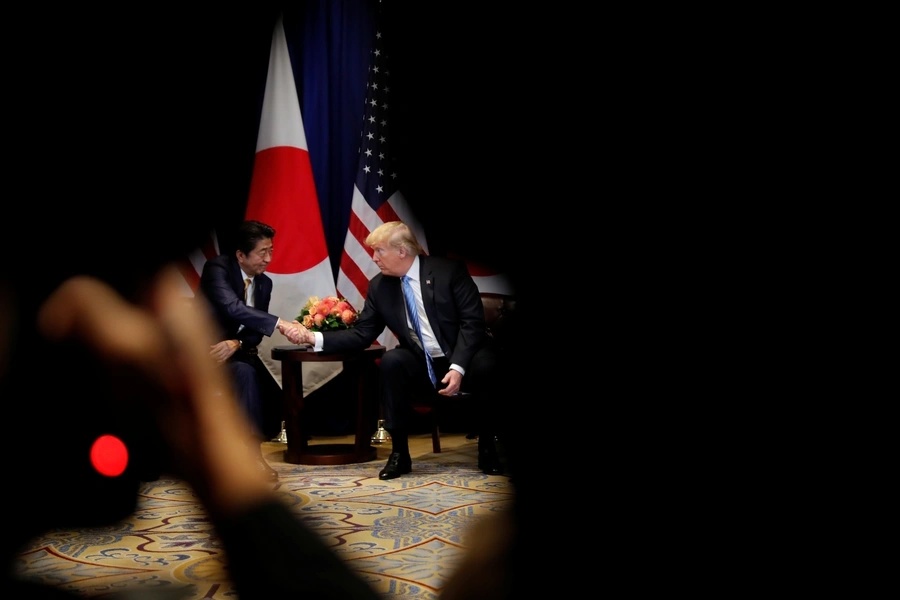Forty-Two and Counting…The Trump-Abe Connection

Yesterday the Washington Post reported that Japanese government officials who tracked the metrics of the Abe-Trump relationship tallied forty-two conversations, in person and on the phone. This is an unprecedented level of communication for the leaders of the United States and Japan. This weekend’s visit by the U.S. president to Tokyo will add even more opportunity for the allied leaders to cement their partnership.
The pomp and circumstance planned for this visit by President Donald J. Trump to Japan reveals just how important the leader-to-leader approach has been to Prime Minister Shinzo Abe. The Japanese government has been adept at drawing out the tempestuous U.S. leader, finding opportunities to show him the benefits of the American partnership with Japan but doing so with a heavily personal touch. Few can forget the photo of Prime Minister Abe in the golf cart with the president early on trying to woo him back to the Trans-Pacific Partnership. On this visit, Trump will visit Japan’s largest and soon to be even more lethal destroyer, the JS Izumo, a nod to Japan’s growing contribution to Asia’s military balance.
More on:
This visit will be no exception. President Trump will be the first world leader to meet with Emperor Naruhito and Empress Masako of Japan. It will showcase Japan’s fresh start in the new Reiwa era, with a young and cosmopolitan Imperial couple in the forefront. And the setting will be, well, Imperial. Red carpet and centuries of dynastic tradition will be mobilized in the service of cementing the primacy of U.S.-Japan relations.
The president will also have some fun. Sports are in the mix. Golf, of course, will be an important setting for a more intimate discussion between Shinzo and Donald. Each visit between the two leaders, whether in the United States or in Japan, has included a golf outing. Last time in Tokyo, Prime Minister Abe impressed the social media world when a video of him slipping into a sand trap and somersaulting out with grace went viral. President Trump quipped, “I said, I will not ask if that’s you, but if it was, I’m very impressed because you’re better than any gymnast I’ve ever seen.”
The president will also spend time with Japan’s famed sumo wrestlers on this trip. A “Trump cup” is in the works, the first time a U.S. president will award the winner of the seasonal tournament with the prize. Expect it to be large—and gold, and emblazoned with the Trump logo. Sumo fans at the event will need to temper their feelings, however. Throwing their zabuton (seat cushions) into the ring will not be allowed, apparently.
This summit will be policy-lite, designed to highlight the strengths of the U.S.-Japan partnership rather than the wrinkles. Those wrinkles are there, however. The Japanese government will likely want to correct the notion that Washington only cares about North Korea’s ICBMs and not its shorter-range missiles that can reach Japan and other U.S. allies. Both President Trump and Secretary of State Mike Pompeo downplayed the recent North Korean missile tests, suggesting a crack in the alliance's deterrent.
Bilateral trade talks perhaps seem closest to the surface for this visit. The announcement by the Trump administration that it is postponing for six months a decision on the imposition of punitive tariffs on autos and auto parts for national security reasons pushed back a critical influence on U.S.-Japan trade discussions. Undoubtedly, Japan’s upcoming summer election makes open friction between the United States and Japan on trade an unwelcome prospect for Abe. But all eyes in Japan will be on the decision-making in Washington on trade.
More on:
Finally, and perhaps at the moment less conspicuous, is the question of Japan’s host nation support for U.S. forces stationed there. The U.S.-South Korea talks ended in acrimony earlier this year, with rumors of the Moon government rejecting absolutely a U.S. demand for a massive increase in South Korean spending. After ten rounds of talks failed, South Korea agreed to pay an additional eight percent to host U.S. troops under an interim one-year deal. Japan hosts 50,000 U.S. military personnel and provides the highest allied contribution to their forward deployment in Asia. Japan may be better positioned than South Korea going into these talks, but the timing of the talks beginning in a U.S. election year could complicate the discussion.
Expect this weekend to be full of smiles, and celebration, however. Japan’s prime minister has pulled out all the stops for this visit, evidence of the continued importance of the United States to his country’s security. Abe will also show Trump the institutional benefits of centuries of Japanese tradition and history, suggesting perhaps that dignity and continuity—as opposed to disruption and unpredictability—have their merits.
 Online Store
Online Store